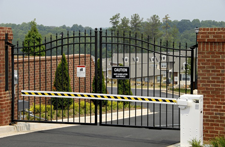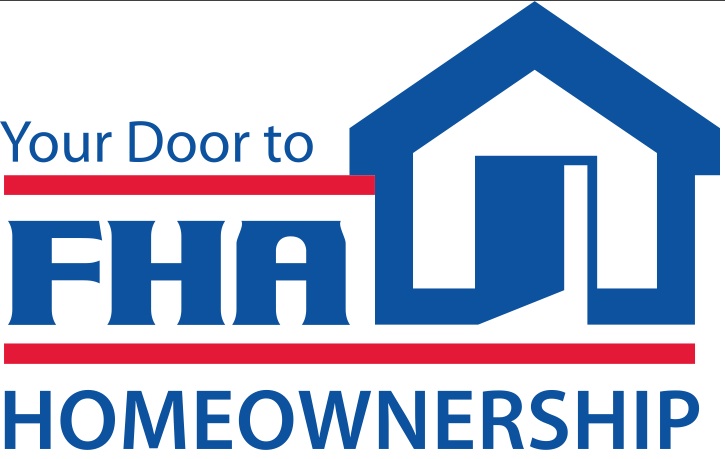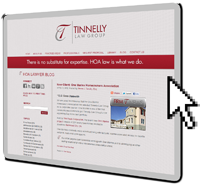|
|
|
|
|
Community Association Update / Issue # 16
Annual Legislative & Case Law Update (2013)
|
|
Legislative & Case Law Update (2013): Introduction
Greetings!
Below you will find an overview of the 2012 legislation and case law impacting California's community associations as we head into 2013. The material below is not meant to be an exhaustive list of all new legislation and case law; we have summarized what we believe is the most important to the majority of our community association clients and the industry professionals who service them. If you have any questions regarding the items below, please feel free to contact our offices anytime. | |

| Sincerely,
Steven J. Tinnelly, Esq.
|
|
AB 805: Davis-Stirling Reorganization & Rewrite
Reorganization of Davis-Stirling Act with some minor changes

The long-awaited rewrite and reorganization of the Davis-Stirling Common Interest Development Act ("the Act") has arrived. AB 805 effectively relocates the Act to a new Part 5 (commencing with Section 4000) to Division 4 of the Civil Code, while AB 806 cleans up numerical references to the Act contained in various California statutes.
The law does not become effective until January 1, 2014 to provide Association industry professionals, homeowners, Board Members and attorneys some time to become acquainted with its new reorganized form. While AB 805 primarily serves to make the Act easier to interpret and apply (e.g., standardizes terminology and groups provisions by subject matter), there are also some substantive changes that Boards and industry professionals should be aware of. We have published a new article, entitled "The Basics of AB 805," which provides an overview of those changes.
Click here to read our article entitled:
"The Basics of AB 805"
|
AB 2273: Bank Foreclosures
Helps Associations resecure assessment streams from foreclosed properties

The difficulty in identifying/contacting the bank who foreclosed on a property, as well as delays in the recording of certain property transfer documents, has hampered the ability of Associations to quickly reestablish the assessment revenue stream from the new owner of the foreclosed property (often, the bank).
AB 2273 adds new Section 2924.1 to the Civil Code and amend current Section 2924(b) of the Civil Code. It serves two (2) important functions:
- It requires the foreclosing party to record the sale within thirty (30) days of the foreclosure to help Associations identify new owners; and
- It shortens the time for Associations to be notified by the foreclosing party of the change in ownership--now fifteen (15) days from the date of sale. However, this only applies if the Association has recorded a "Request for Notice" prior to the property receiving a Notice of Default.
For more information on AB 2273, click here to read our blog post entitled:
"AB 2273: Resecuring HOA Assessment Streams from Foreclosed Properties "
|
SB 880 - Electric Vehicle (EV) Charging Stations
Resolves defects within newly enacted EV statutes

In 2011 the California Legislature rushed through SB 209 which broadly required Associations to allow electric vehicle (EV) charging stations on common areas. The industry immediately noted SB 209's various defects, including its apparent conflict with existing Civil Code provisions governing how common areas may be granted to individual homeowners for their exclusive use.
SB 880 was signed into law in 2012 as an "urgency statute." SB 880, effective immediately, is a "clean up" measure intended to correct constitutional flaws posed by SB 209, resolve a conflict with Civil Code Section 1363.07, and correct apparent ambiguities within the language of the statute.
For more information on SB 880, click here to read our blog post entitled:
"SB 880 - EV Charging Stations (Round 2)"
|
AB 1838: Association Records
Limitations of fees charged by Associations in producing documents

Existing law specifies certain documents that an association must provide to a prospective purchaser before the sale of the property, and requires a form that estimates the cost of providing those documents. AB 1838 bill prohibits an association from charging a cancellation fee for the documents if the cancellation is requested in writing by the same person who ordered the documents and if the association had not yet started working on the order or if the such work had already been compensated. Additionally, Associations are required to refund all fees charged for documents if the order was canceled in writing and work on the order had not yet been performed. Where work on the order has already started, Associations must refund the share of fees collected for the documents which represent the portion of the work not yet performed on the order.
|
AB 341: Recycling Requirement
Mandatory recycling for multifamily residential dwellings of 5 units or more

California's policy goal behind AB 341 is to have not less than 75% of solid waste generated be source reduced, recycled or composted by the year 2020. AB 341 aims to help achieve that goal by requiring California businesses that generate four (4) or more cubic yards of solid waste weekly, as well as multifamily residential dwellings of five (5) units or more, to arranage for recycling services by July 1, 2012. Local jurisdictions are to oversee those recycling programs and to recover their costs from solid waste generators.
|
AB 1720: Gated Communities; Service of Process
Private investigators granted access to gated communities to serve process

Existing law ensures that registered process servers are provided access to gated communities upon display of proper identification and documentation. AB 1720 provides that same access to private investigators. However, it only applies to staffed gated communities with controlled access.
|
Tesoro del Valle Master HOA v. Griffen (2011)
Architectural restrictions on the installation of solar energy systems

*Tesoro was decided in December of 2011 and thus failed to make last year's Legislative & Case Law Update.
Tesoro dealt with many factual and procedural issues regarding the process by which the defendants' application for a solar energy system was denied by his Association's Architectural Control Committee. However, the most interesting aspects of the holding relate to the court's interpretation of three issues concerning an Association's legal obligations under Section 714 when evaluating an application for the installation of a solar energy system. In general, those issues include how to determine whether a restriction on the installation of a solar energy system is "reasonable" under the Civil Code, (ii) how an Association can consider the aesthetic impact of a solar energy system in determining whether to grant approval, and (iii) what the Association's obligations are when it denies an application.
For more information about this case, click here to read our blog post entitled:
"Shining Some Light on Architectural Review of Solar Energy Systems"
|
Pinnacle Museum Tower Assn v. Pinnacle Market Development (2012)
Developers entitled to rely on arbitration provisions contained in recorded CC&Rs

The California Supreme Court's ruling in Pinnacle will undoubtedly impact Associations, developers, owners and insurers in disputes arising from construction defects. It reversed the lower courts' decisions which previously hampered the enforcement of arbitration provisions contained in recorded CC&Rs. Central to the Court's ruling was its recognition that CC&Rs constitute a contract and that there is a strong public policy favoring arbitration/alternative dispute resolution over litigation--a public policy which is embodied in various Civil Code provisions pertaining to Associations. Unless an arbitration provision contained in the CC&Rs is deemed "unreasonable," a developer is now entitled to rely on the terms of the contract and the enforcement of the arbitration provision.
For more information about this case, click here to read our blog post entitled:
"Arbitration Provisions Rise Again in Construction Defect Disputes"
|
In re Antonio Cisneros (2012)
Assessment collections fees in "No-Cost" collections contracts

The ruling of the US Bankruptcy Court in California in this case may impact the terms under which Associations contract with collections companies to pursue delinquent assessments.
The debtor, Cisneros, owned two properties within the Association and had fallen behind on his assessment payments. Cisneros ultimately filed Chapter 13 bankruptcy in order to save his properties and cure his assessment arrears. The Association had contracted with a collections company to recover the delinquencies from Cisneros. That contract specifically stated that if the collections company was "unable to collect fees or costs from the delinquent Owner or other responsible party, [then the] Association shall not be responsible for such fees or costs." Accordingly, under the terms of the contract, the Association was under no true obligation to pay the fees or costs incurred by the collections company. That contractual provision was what the Bankruptcy Court relied upon in disallowing the collections company's claims to recover its roughly $14,000 in collections fees and costs from Cisneros.
For more information about this case, click here to read our blog post entitled:
"Assessment Collections Fees in "No-Cost" Collections Contracts"
|
That v. Alders Maintenance Corporation (2012)
Recovering Attorneys' fees in Association Election Disputes

This case underscores how crucial it is for Associations to strictly comply with the Civil Code's election procedures and requirements. The appellate court applied Civil Code § 1363.09 to hold that an Association's attorneys' fees and costs are generally not recoverable by an Association should it prevail against a member in an election dispute. However, the same is not true for a member should she instead prevail against her Association. The appellate court did, however, leave open the possibility that an Association could recover such fees if provided in the Association's governing documents.
For more information about this case, click here to read our blog post entitled:
"Recovering Attorneys' Fees in HOA Election Disputes"
|
|
Some speech made about Board members can give rise to claims of defamation

We have blogged in the past about the unique "quasi-governmental" status of Associations and how certain speech made by homeowners and Board candidates is afforded constitutional protection. In Silk v. Feldman, a similar situation arose where Feldman (a candidate for the Board) sent letters to the membership accusing former director Silk (who was also running for the Board) of self-serving actions when she was previously on the Board. Silk sued for defamation and libel per se. Feldman filed an anti-SLAPP motion to dismiss, stating that his comments were protected as free speech in relation to an issue of public interest.
The trial court denied his anti-SLAPP motion on the grounds that the alleged defamation was not an exercise of free speech. The appellate court agreed with the lower court, finding that Silk was likely to prevail on her claims of defamation and libel per se because she offered ample evidence which contradicted the statements made about her by Feldman. This case is unique in illustrating how, as the appellate court noted, "not all speech is free." It suggests that defamatory statements made about Board members are not automatically afforded constitutional protection where ample evidence can be produced to illustrate their falsity.
If you would like to read the case, click here.
|
Fannie Mae: Condominium Insurance Requirements

Fannie Mae announced new insurance requirements for condominiums that affect mortgage loan applications dated on or after January 1, 2012. Those requirements change the HO-6 insurance coverage from at least 20% of the condo's appraised value to an amount sufficient to repair the condo to its prior condition before the loss. Furthermore, blanket insurance policies that cover multiple condominiums or other residential projects will be allowed so long as certain coverage criteria are met.
For more information, click here to read the Fannie Mae Servicing Guide Announcement SVC-2011-23
|
Federal Housing Administration: Condominium Certification Requirements

The Federal Housing Administration (FHA) has revised its condominium approval guidelines. In sum, the changes operate (1) to relax the Delinquency criteria a condominium association must meet, (2) to require the purchase of Employee Dishonesty Insurance for condominium projects with more than 20 units, (3) to place new certification requirements on individuals submitting approval applications, and (4) to relax the limits on commercial space that a condominium may have before the FHA will grant approval.
For more information, click here to read our blog post entitled:
"FHA Releases Revisions to Condominium Approval Guidelines"
|
|

2012 was a year of growth for Tinnelly Law Group and we can't thank our clients and industry partners enough for their continued support. We were proud to welcome a new Attorney, Marketing Director, and approximately 30 new Association clients to the TLG family. We were also excited to open our San Francisco Bay Area office to better service the needs of our growing Northern California client portfolio. As we look ahead into 2013, we are poised for more growth and we are looking forward to an expansion of our firm's service offering. Keep a look out over the next few months for more to come!
|
|
Welcome New TLG Clients!
| |
Apple Valley
| |
Foster City
| |
Irvine
| |
Anaheim Hills
|
|
Be sure to check out the TLG Blog!
 Our blog is updated weekly with mini articles on an array of HOA legal topics and new case law. We encourage Boards and Managers to send us questions online for our attorneys to answer on our blog. Our blog is updated weekly with mini articles on an array of HOA legal topics and new case law. We encourage Boards and Managers to send us questions online for our attorneys to answer on our blog.
To get updated when we publish a new post, be sure to like us on facebook!

|
|
|
|
|
|
Community Association Update - Issue #16
Annual Legislative & Case Law Update (2013)
NOTICE: The information contained in the Community Association Update is for educational and informational purposes only and does not constitute legal advice, nor is it meant to create an attorney-client relationship.
|
 Corporate Headquarters: Corporate Headquarters:
30 Enterprise - Suite 320
Aliso Viejo, CA 92656
P: 949.588.0866
F: 949.588.5993
contact@tinnellylaw.com
| |
Orange County | Los Angeles | San Diego | Riverside County | San Francisco Bay Area
|
|
|